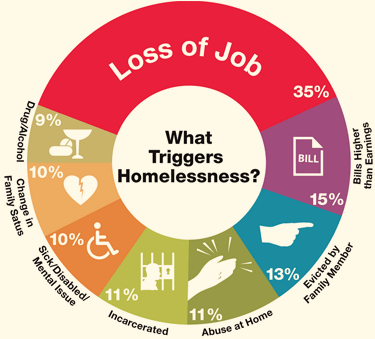Housing and Homelessness
100,000 Homes – the Campaign is a national movement of over 175 communities working together to find permanent homes for 100,000 chronic and medically vulnerable homeless Americans by July 2014. 100,000 Homes communities have already moved more than 20,000 homeless Americans into permanent housing, transforming their public systems along the way. Powered by Community Solutions and supported by a broad base of national and local partners, the Campaign helps communities turn their services systems capable of ending street homelessness for good. As a movement, we are not interested in managing homelessness indefinitely. We are interested in ending it. Participating communities do three things differently: First they identify every homeless person on their streets by name. Second they track and measure their local housing rates against clear monthly goals. Third, they improve local systems to make housing simpler, faster and more efficiently targeted.
Building Dignity, Washington State Coalition Against Domestic Violence – explores design strategies for domestic violence emergency housing. Thoughtful design dignifies survivors by meeting their needs for self-determination, security, and connection. The ideas here reflect a commitment to creating welcoming, accessible environments that help to empower survivors and their children Building Dignity is the essence of advocacy, Seattle and Olympia, WA.
Building Dignity, Washington State Coalition Against Domestic Violence – explores design strategies for domestic violence emergency housing. Thoughtful design dignifies survivors by meeting their needs for self-determination, security, and connection. The ideas here reflect a commitment to creating welcoming, accessible environments that help to empower survivors and their children Building Dignity is the essence of advocacy, Seattle and Olympia, WA.
District Alliance for Safe Housing – an innovator in providing access to safe housing and services to survivors of domestic and sexual violence and their families as they rebuild their lives on their own terms. No matter what the situation, we meet survivors where they are and strive to eliminate all barriers that prevent them from accessing safe housing. We work to ensure that all survivors have the tools and skills they need to be exactly who they choose to be and to create and maintain safe homes. We support partner agencies in the national capital region and throughout the United States in increasing their capacity to assist survivors in accessing safe housing. DASH educates policy makers and service providers nationwide on the principles and best practices of successfully assisting survivors of domestic violence in recognizing that they are empowered and whole, Washington, DC.
Domestic Violence Housing First, Washington State Coalition Against Domestic Violence – eliminates housing as a reason for survivors to stay in an abusive relationship by providing advocacy and a flexible approach to support that gives survivors the ability to establish a home and the freedom to choose how best to rebuild their lives. Key components of Domestic Violence Housing First include: tailored services, mobile advocacy, housing search support, landlord education, and temporary financial assistance, Seattle and Olympia, WA.
Institute for Children, Poverty & Homelessness – an independent nonprofit research and development organization. Founded in 1990, ICPH focuses on action-oriented research designed not just to study the complex issue of family homelessness, but also to provide data and ideas that will inform and enhance public policy on service homeless families. In addition to bringing information to policy makers at all levels of government and to colleagues in the research and advocacy community, ICPH also works to raise public awareness of homelessness through publications and other materials for schools and communities. ICPH researchers the causes of family homelessness, the demographics of this growing population, the conditions that make it difficult for homeless families to become self-sufficient, and the programs that are most effective in helping them transition our of poverty. ICPH works with programs and partner organizations across the U.S. to conduct and disseminate this research in order to improve services and influence public policy, New York, NY.
- National Survey of Programs and Services for Homeless Families ~ The Red, White, and Blue Book – a resource for service providers, advocates, researchers, and public policy makers working in the field of family homelessness. This guide provides a state-by-state snapshot of the interconnections between governmental and nonprofit work to end family homelessness.





